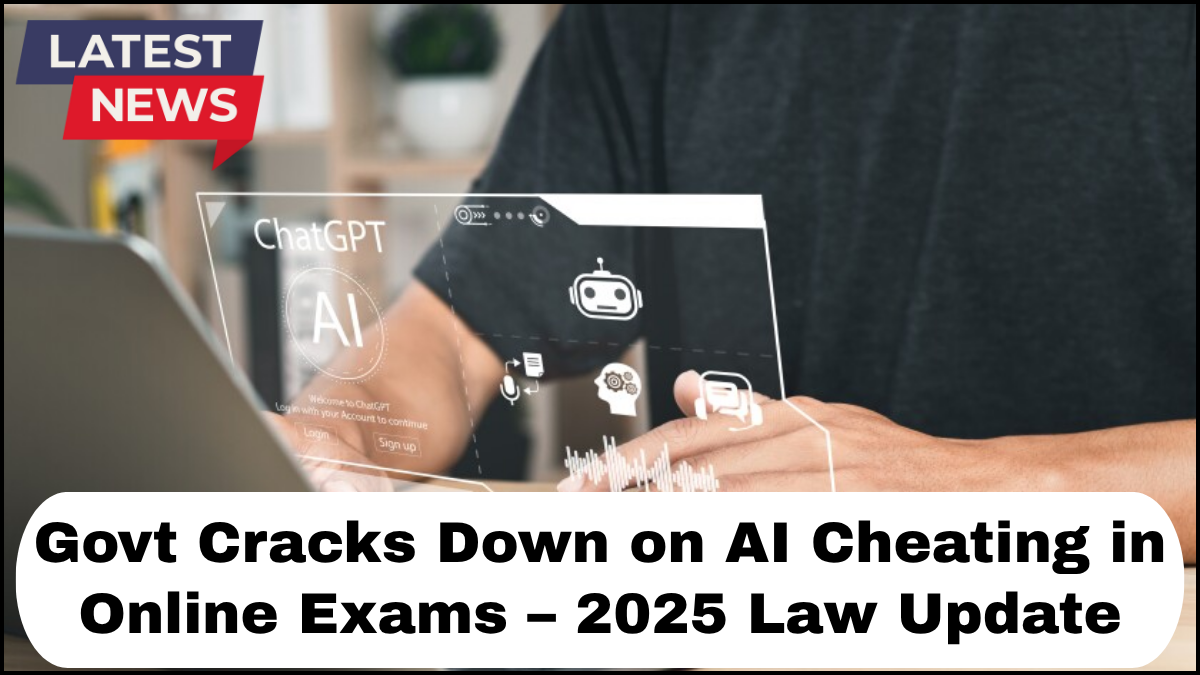In a bold move to uphold academic integrity, the government has launched a sweeping crackdown on online exam cheating, targeting the growing misuse of artificial intelligence in remote assessments. With the rapid rise of AI-powered tools that can write essays, solve equations, and even mimic human behavior, educational institutions have been struggling to maintain fair testing environments. The 2025 law update now brings tighter regulations, new monitoring standards, and serious penalties for both students and facilitators involved in AI-assisted cheating.

The Rise of AI in Online Exams
Since the COVID-19 pandemic accelerated the shift to remote learning, online exams have become the norm across schools, colleges, and certification platforms. However, this digital transformation also opened the door to more sophisticated forms of cheating.
Students now have access to a range of AI tools that can answer complex questions in real time. Language models can write essays that bypass traditional plagiarism detectors. AI image recognition tools can solve handwritten math problems within seconds. Even voice-based AI assistants have been used covertly during exams.
The scale of the problem became undeniable in 2024 when a national academic audit found that nearly 23% of students had accessed some form of AI assistance during remote tests. These numbers triggered alarm bells across the education sector, prompting immediate action from policymakers.
2025 Legal Reforms: What’s Changed?
The Govt crackdown on online exam cheating in 2025 introduces several new measures aimed at curbing AI misuse:
1. AI-Usage Detection Mandate
All accredited educational institutions are now required to implement AI-detection software during online exams. These systems use behavioral analytics, keystroke tracking, and real-time proctoring to flag suspicious activity, including rapid response times or non-human writing patterns.
2. Penalties and Criminal Liability
The new law classifies the use of unauthorized AI tools during exams as academic fraud, with penalties that range from academic suspension to criminal prosecution in severe cases. Students caught cheating via AI can be barred from sitting for public exams for up to three years.
Institutions or private tutors who promote or enable AI-based cheating can face fines up to ₹10 lakh and possible imprisonment under the updated provisions of the Prevention of Unfair Means Act.
3. Certified Proctoring Platforms
Only government-approved digital proctoring tools are now permitted for official online exams. These tools must include biometric verification, continuous webcam monitoring, and live AI supervision to ensure exam integrity.
4. Centralized Reporting Mechanism
The Ministry of Education has launched a centralized portal for reporting incidents of AI-enabled cheating. Students, educators, and whistleblowers can now anonymously report suspicious behavior or unethical platforms facilitating such acts.
The Role of EdTech Platforms
Many edtech platforms are under scrutiny following the new reforms. Some startups had quietly integrated advanced AI features into their test-prep tools, which, though not marketed for cheating, were easily misused. As a result, the government has issued compliance notices to over 50 edtech companies, requiring transparency about their AI capabilities and intended usage.
Platforms found violating these norms risk being blacklisted and banned from partnering with accredited institutions.
Impact on Students and Educators
While some students argue that the law is overly harsh, education experts insist it’s a necessary step to level the playing field. Instructors also face increased responsibilities, from redesigning exam formats to undergoing training on new proctoring tools.
To support educators, the government is rolling out workshops and grants to help institutions adopt compliant technologies without overburdening staff.
Meanwhile, students are being advised to steer clear of AI shortcuts and focus on ethical learning. The Ministry has also introduced awareness campaigns in schools and colleges to educate young learners about the long-term consequences of academic dishonesty.
Looking Ahead
The 2025 crackdown is not just a reactive policy; it’s a foundational shift toward building a more accountable and transparent digital learning ecosystem. While technology continues to evolve, so must the systems that govern its use. Striking the balance between innovation and integrity is now the education sector’s top priority.
FAQs
Q1: What qualifies as AI-assisted cheating under the new law?
Any use of AI tools—such as language models, math-solving bots, or voice assistants—during an online exam without authorization is considered AI-assisted cheating.
Q2: Are there any exceptions for students using assistive technology?
Yes. Students with verified disabilities may use approved assistive tech, but it must be declared and monitored according to official guidelines.
Q3: Can students face criminal charges for online exam cheating?
Yes. Under the 2025 update, severe cases of online exam cheating, especially those involving organized fraud, can lead to criminal prosecution.
Q4: What should students do if they’re falsely accused?
They can appeal through their institution’s grievance cell or file a complaint on the government’s centralized portal, which will initiate an impartial investigation.
Q5: How can institutions stay compliant with the new rules?
Institutions must use certified proctoring tools, train staff in AI-detection protocols, and ensure that all exam formats discourage misuse of external technology.
click here to learn more